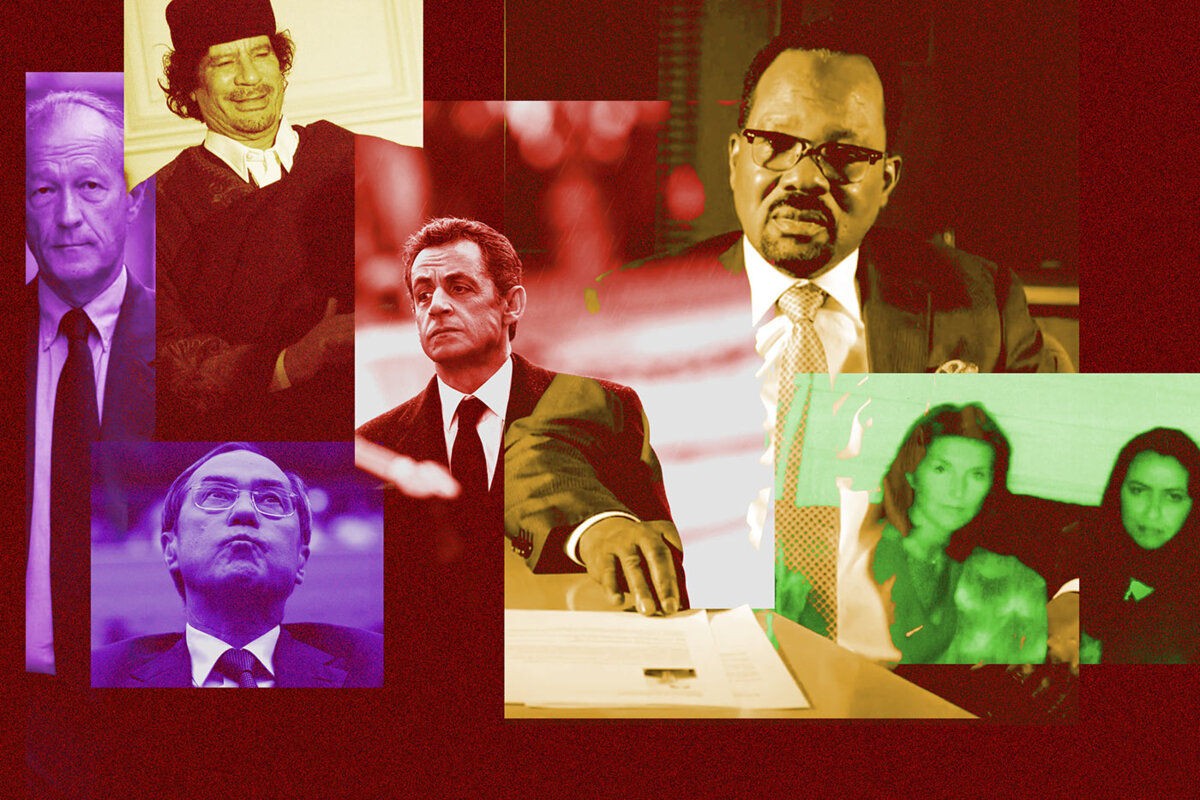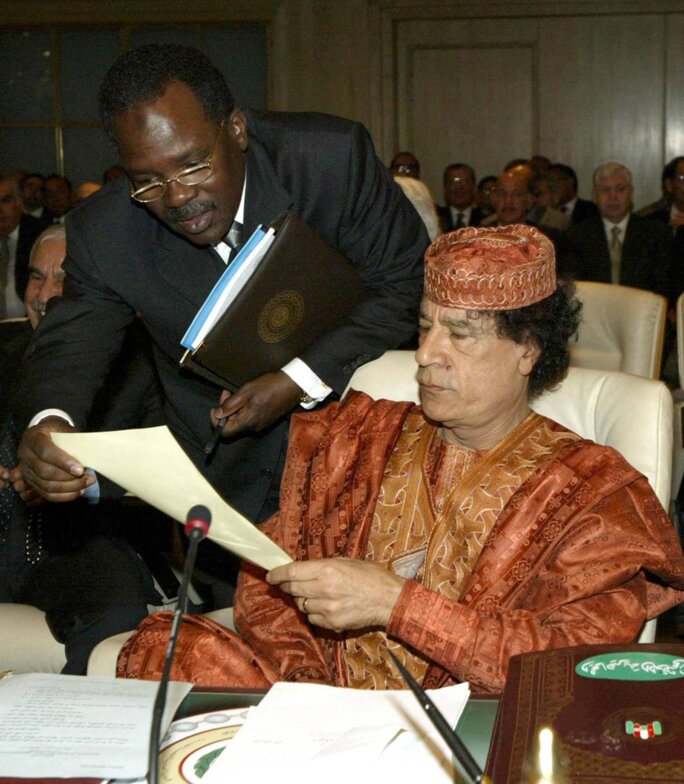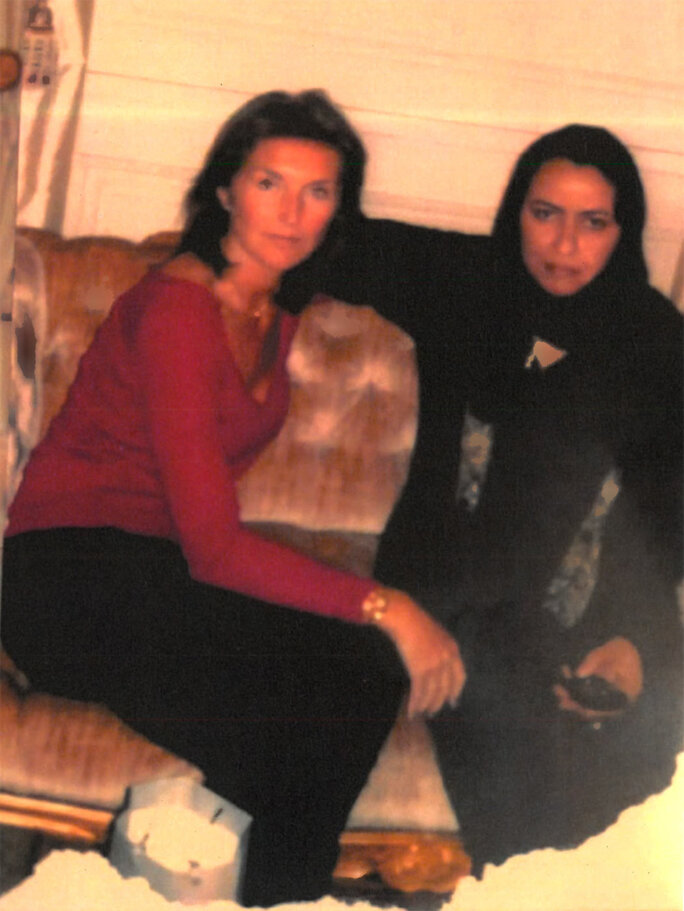The former chief of staff of the late Libyan dictator Muammar Gaddafi has given a legal statement describing how he was informed that Nicolas Sarkozy directly asked Gaddafi for “help” with his 2007 presidential election campaign, Mediapart can reveal.
In a statement to the public prosecution services of Libya’s internationally recognised Government of National Unity, based in Tripoli, Bashir Saleh, who was also the head of Libya’s multi-billion-dollar Libyan African Investment Portfolio, part of the country’s sovereign wealth fund, said he was told Sarkozy made the approach to Gaddafi during a visit to Tripoli on October 6th 2005, when Gaddafi reportedly replied “If my friend Chirac does not stand, I am ready to help you”.
The Libyan prosecutors have also obtained a very detailed account from Gaddafi’s former personal secretary, Ahmed Ramadan, alleging how the regime funded Sarkozy’s 2007 campaign.
In 2005, Sarkozy was France’s interior minister, under the presidency of Jacques Chirac, and was actively and openly preparing his bid to succeed Chirac as the conservative candidate (in a much-commented TV interview November 2003 Sarkozy was asked if he thought of the presidential elections when he shaved, to which he replied “not only when I shave”).
The details of Saleh’s statement, obtained by Libyan prosecutors who travelled to question him in Dubai in 2019, and that of Ramadan, were given in June this year to the judicial investigation opened in France into the suspected funding by the Gaddafi regime of Sarkozy’s 2007 election campaign.
The judge-led probe has placed Sarkozy, 67, under investigation for “corruption”, “criminal conspiracy”, “illicit campaign financing” and “receiving the proceeds of the misappropriation of public funds”.
Sarkozy vigorously denies any wrongdoing.

Enlargement : Illustration 1

Under French law, a person can only be placed under investigation if a magistrate establishes serious and (or) concurring evidence that they committed a crime. It is only if and when a magistrate decides to send an individual for trial that they are formally charged.
Nicolas Sarkozy did not respond to questions submitted to him by Mediapart during the preparation of this report.
In early June, judge Aude Buresi, the magistrate in charge of the French investigation, travelled to Tripoli, accompanied by a senior officer of the French judicial police force’s anti-corruption branch, and a magistrate from the French public prosecution services’ financial crime branch, the PNF, to meet with Libyan public prosecutor Omar Askilih.
He gave an account in Arabic of the statements given by Saleh and Ramadan, which was then translated into French and recorded in an official document, to which Mediapart has gained access, now added to the case file of the French investigation.
“He [Bashir Saleh] had heard that Nicolas Sarkozy had asked Muammar Gaddafi to help him with his campaign. Muammar Gaddafi replied to Nicolas Sarkozy […] ‘If my friend Chirac does not stand, I am ready to help you’,” Askilih told the French investigators in his summary of the interview of Saleh. He added that Saleh said he did not know “how this aid was paid”.
The Libyan prosecutors had separately questioned Saleh and Ramadan in the framework of an international judicial cooperation agreed with the French.
Askilih also told the French delegation that the Libyan state (as represented by the internationally recognised Government of National Unity) is to become a civil party – or plaintiff – to the case in France. The suspicion of “receiving the proceeds of the misappropriation of public funds” levelled against Sarkozy, and others under investigation in the probe, refers to Libyan public funds.
Bashir Saleh, 76, who the media has dubbed “Gaddafi’s banker”, is now the subject of an international arrest warrant issued by France in relation to Buresi’s investigations.
He has previously claimed that he knew nothing of the Gaddafi regime’s alleged funding of Sarkozy’s campaign. In an interview with the French edition of Vanity Fair, published in December 2013, he declared that “all this story is invented”. In 2018, he was interviewed for a current affairs programme, Cash Investigation, broadcast on public channel France 2. Once again, he denied knowledge of the alleged funding, but in a discussion after the interview, when he was being filmed without his knowledge, he clearly confirmed the regime had indeed provided funds for the campaign.
Bashir Saleh on the run, under French protection
After the Gaddafi regime was toppled in 2011, Saleh, under French protection, fled Libya for France, where his wife owned a property. He continued to enjoy official protection in France, where he was issued with a residence permit, despite the fact that in March 2012 Interpol had issued a “red notice” for his arrest, pending his eventual extradition back to Libya where he was wanted by the country’s new authorities on charges of fraud, misappropriation of public funds and abuse of power.
On April 28th 2012, Mediapart revealed a document recovered from the archives of the Gaddafi regime. This was a note dated December 2006 and addressed to Saleh by the then head of Libya's foreign intelligence agency Moussa Koussa, who detailed an agreement to fund Sarkozy’s 2007 presidential election campaign.
Mediapart’s report was published before the final round of voting, on May 6th, in that year’s presidential elections, when Sarkozy was seeking a second term in office (but was finally beaten by his socialist rival François Hollande).
On May 3rd 2012, Saleh was secretly smuggled out of France in an operation involving Bernard Squarcini, then head of the French domestic intelligence service, and Alexandre Djouhri, a business intermediary close to Sarkozy and now a key suspect in the Libyan funding investigation.
Saleh was flown to his native Niger, and soon after settled in South Africa, where Gaddafi and his family held vast assets. In February 2018, Saleh was wounded in a shooting attack as he was being driven by taxi to his Johannesburg residence. South African police later dismissed speculation that Saleh was the target of a “hit” operation, officially concluding he was the victim of a violent robbery. Nevertheless, the true motive for the attack remains uncertain, and shortly afterwards Saleh left South Africa for Dubai.
According to the account given in June to judge Aude Buresi by Libyan prosecutor Omar Askilih, when Saleh was questioned about the visits to Tripoli of Sarkozy emissaries (who, it is established, include Claude Guéant and Brice Hortefeux, two longstanding Sarkozy allies), Saleh said he had met only with Alexandre Djouhri, who he described as “his friend”, and this “before, during and after the [electoral] campaign” in France.
Bashir is at your disposal at any time
Askilih, paraphrasing the statements given by Saleh, said that, “Muammar Gaddafi asked him [Saleh] to be a link in the chain when Nicolas Sarkozy was president, it was him who translated the phone calls between Muammar Gaddafi and Nicolas Sarkozy”.
In 2012, Mediapart published a French translation of the transcription of a phone conversation held between Gaddafi and Sarkozy on May 28th 2007, three weeks after the latter was elected as president of France. The original transcription, in Arabic, was found in archives of the regime after its collapse in 2011, and was authenticated by French diplomatic sources. During the conversation, Sarkozy asked Gaddafi: “Who is the person I could meet to converse on delicate matters? Is it Mr Bashir?” To which Gaddafi replied: “Bashir is at your disposal at any time.”
Questioned about which services of the Gaddafi regime could have provided funding for Sarkozy’s campaign during and after the 2007 French election campaign, Saleh said he was not responsible and that the only person who would have been was the head of the Libyan dictator’s financial bureau, Nouri al-Abahni, who has since died. Askilih told the French investigators that Abhani was in charge of a “special budget” for visitors and gifts.
The Libyan prosecutor said Saleh had explained that, “It was Nouri al-Abahni who paid the travel expenses of Bashir Saleh. Alexandre Djouhri paid his hotel bills and then went to see Nouri al-Abahni to be reimbursed”.
Saleh also said he had no responsibility for alleged payments made by Abdullah Senussi, Gaddafi’s brother-in-law and security chief, which the French investigation has traced to an account held in The Bahamas by a close friend and political ally of Sarkozy’s, Thierry Gaubert.

Enlargement : Illustration 2

Askilih explained to the French investigators that while Saleh denied his own involvement in any of the alleged secret payments, Saleh “believed what Muammar Gaddafi said” in a March 2011 interview, “when he [Gaddafi] indicated that Nicolas Sarkozy’s campaign was financed to a level of 20 million dollars”. In fact, Gaddafi never mentioned a precise sum in any of his interviews. But he did to his official interpreter, Moftah Missouri, who confirmed as much in an interview with Mediapart.
Saleh is also placed under investigation in the French judicial investigation, which issued an international arrest warrant against him, over a transfer of 10.1 million euros he made to a company registered in Panama belonging to Alexandre Djouhri. The money came from the Libyan African Investment Portfolio, of which he was head, and was purportedly for the purchase of a villa in France which, it has been established, was worth no more than 2 million euros.
During the meeting in June with the French investigators, Omar Askilih also gave a summary of statements made, in two separate interviews with the Libyan prosecution services, by Gaddafi’s personal secretary, Ahmed Ramadan. This also figures in the French investigation’s report of what Askilih detailed, and which Mediapart has gained access to.
Ramadan gave an account of what he said was Sarkozy’s “first visit to Tripoli”, in October 2005. “During Nicolas Sarkozy’s visit, the latter asked Colonel Gaddafi to support him financially and morally for his forthcoming election campaign,” he told the prosecutors. “Muammar Gaddafi gave his agreement. Minutes were then written up to transcribe the verbal exchange during this meeting: the request made by Nicolas Sarkozy and the agreement of Muammar Gaddafi. The minutes were written up by Muammar Gaddafi’s command [sic].”
This meant the minutes were recorded by Issa Koussa, a senior aide to Gaddafi and the brother of Gaddafi’s foreign intelligence chief, and later foreign minister, Moussa Koussa. According to Ramadan, Bashir Saleh and Gaddafi’s interpreter Moftah Missouri were both present at the meeting.
Ahmed Ramadan, who said he read the minutes, detailed that “the value of the support was not mentioned”, and that “only the principle of the support was evoked, and also that Baghdadi [editor’s note, Libyan prime minister al-Baghdadi al-Mahmoudi], Bashir Saleh and Abdullah Senussi [would] be kept informed”.
It was Sarkozy who had broached the subject (of Libyan funding)
Meanwhile, Mabrouka Sherif, another close aide of Gaddafi’s who was a member of his protocol team with responsibility for accompanying visits to Libya by women dignitaries, has directly told the French investigation that “it was Sarkozy who had broached the subject” of Libyan funding.

Enlargement : Illustration 3

In a statement to the judicial probe, referring to Gaddafi by his self-proclaimed title of “Guide of the revolution”, she said: “He [Sarkozy] said to the Guide: ‘I envisage presenting myself for the elections’, and the Guide replied to him: ‘It is a good thing that a friend of Libya, and a personal friend, be the president of the French republic’. So he asked the late Guide, Muammar Gaddafi, to support and help him in his electoral campaign […] The request was formulated by president Sarkozy [sic] to his friend the Guide.”
Apart from her role in Gaddafi’s protocol team, Mabrouka Sherif has been widely reported as having helped procure young women allegedly for sexual abuse by the dictator.
In Ahmed Ramadan’s statement to the Libyan prosecution services, as detailed by prosecutor Omar Askilih and recorded by the French investigation, Gaddafi’s former personal secretary described the financial arrangements made after Sarkozy’s meeting with Gaddafi in October 2005. “Following that meeting […], Gaddafi asked Baghdadi, Saleh and Senussi to put the support into place. Abdulla Senussi was not present during this briefing, but Muammar Gaddafi informed him of the contents. Sums of money were indeed paid during the campaign. There is proof of the release of the funds. There are receipts that mention the amounts.”
These funds were reportedly transported to France in a special flight from Tripoli
Ramadan said he had himself seen “receipts for 7 million euros”, which he said he photographed, while the original receipts were kept by Bashir Saleh.
Prosecutor Askilih told the French investigators: “The funds come from a budget allocated under an article [of law] concerning political support, financed by the people’s committee for external liaison, via the ministry of foreign affairs. The payment is made on the instruction of the commander general [Muammar Gaddafi].”
According to Ramadan’s account, Baghdadi received a cash payment from the treasury ministry, which he then passed on to Abdulla Senussi. “The receipts are signed by Ashour Tribel in his position as minister of the treasury, and countersigned by Baghdadi,” Ramadan said.
Ramadan said the 7 million euros which he had seen receipts for would have represented but a part of the funds that were paid out. “The support would have been made by [bank] transfer and in cash,” he added. “The funds would have departed from the Libyan Foreign Bank towards a bank in Lebanon.”
Ramadan said he saw the name of Ziad Takieddine on one of the transaction receipts. Paris-based French-Lebanese businessman Ziad Takeddine, a key suspect in the French probe, acted as the intermediary who introduced Sarkozy’s inner political circle – including his chief of staff Claude Guéant – to contacts in Libya, and who, before the 2007 elections in France, organised the transfer of 440,000 euros sent from Libya onto a secret offshore account of Sarkozy’s close friend and political ally Thierry Gaubert.
Prosecutor Askilih told the French investigators: “Bashir Saleh [allegedly] confided to Ahmed Ramadan that he had, for his part, given at the same time 8 million euros to Claude Guéant in France. He reportedly used funds coming from the LAIP [sovereign wealth fund]. These funds were reportedly transported to France in a special flight from Tripoli. During this transfer, Bashir Saleh was accompanied by Nouri al-Abahni [head of Gaddafi’s financial bureau]. This transfer was made a little while after the receipts [were issued]. It was during the presidential campaign in France.”
Claude Guéant, who became secretary general of the presidential office, the Élysée Palace, under Sarkozy who later appointed him as interior minister, has consistently denied any wrongdoing, insisting that at the time he had “never seen or heard mention of Libyan funding” for Sarkozy’s 2007 election campaign.
According to Ramadan, Saleh reimbursed the LAIP with the sum taken out of it “via the public treasury budget, under the cover of political support”.
Prosecutor Askilih also said that, following Ramadan’s account, he had filed requests for archived records from the Libyan Foreign Bank and the finance ministry concerning the alleged transfer of funds, as well as submitting a request to the Libyan civil aviation authorities for information “about the special flight chartered for Bashir Saleh”. He added that a list has been established of former Libyan civil servants and officials of the Gaddafi regime who are to be questioned over the coming months.
-------------------------
- The original French version of this report can be found here.
English version by Graham Tearse
-------------------------
If you have information of public interest you would like to pass on to Mediapart for investigation you can contact us at this email address: enquete@mediapart.fr. If you wish to send us documents for our scrutiny via our highly secure platform SecureDrop please go to this page.
-------------------------


